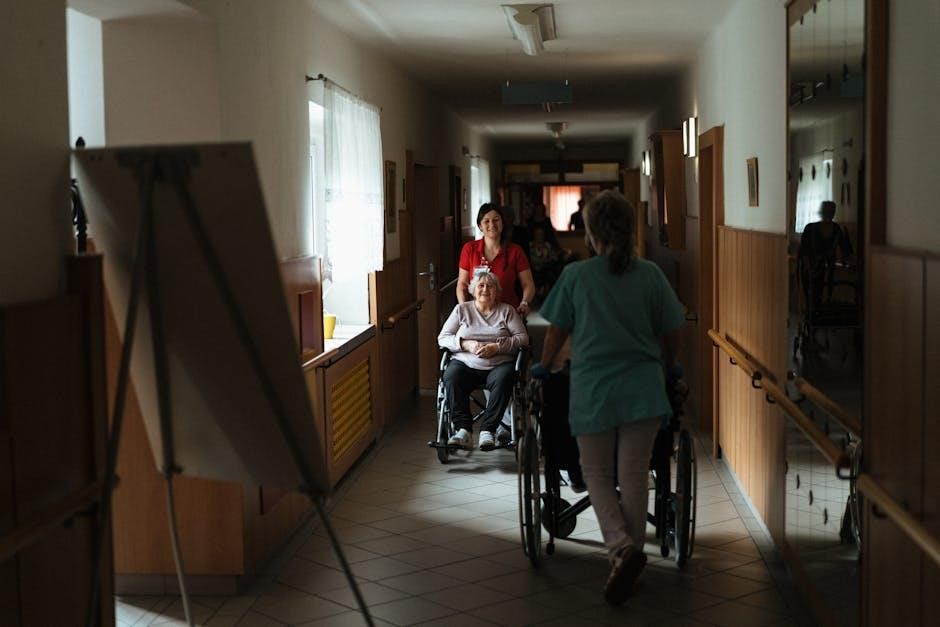Nursing Assistant Care: The Basics PDF
Explore the fundamentals of nursing assistant care with readily available PDF resources. These materials often cover essential information for those entering or advancing in the field. Look for comprehensive guides that provide foundational knowledge and practical skills.
The nursing assistant (NA) plays a crucial role in long-term care facilities, providing direct care and support to residents. These facilities offer a range of services for individuals who require assistance with daily living activities due to age, illness, or disability. The NA is often the primary caregiver, spending significant time with residents and developing close relationships with them.
In long-term care, the NA’s responsibilities include assisting residents with personal hygiene, such as bathing, dressing, and toileting. They also help with mobility, feeding, and monitoring vital signs. Furthermore, NAs provide emotional support and companionship, creating a safe and comfortable environment for residents. Their role is vital in promoting residents’ well-being and quality of life.
Effective communication and observation skills are essential for NAs in long-term care. They must be able to communicate effectively with residents, their families, and other healthcare professionals. NAs also need to be observant, noting any changes in a resident’s condition and reporting them to the appropriate medical staff. This ensures that residents receive timely and appropriate care.
The NA’s role in long-term care is demanding but also rewarding. By providing compassionate and competent care, NAs make a significant difference in the lives of residents and their families.
Comparing Long-Term Care to Other Healthcare Settings
Long-term care differs significantly from other healthcare settings like hospitals and clinics. Hospitals primarily focus on acute care, providing short-term treatment for illnesses or injuries. Clinics offer outpatient services, including routine check-ups and minor procedures. In contrast, long-term care facilities provide ongoing care for individuals with chronic conditions or disabilities who require assistance with daily living.
One key difference is the duration of care. Hospital stays are typically brief, while long-term care residents may live in the facility for months or years. This extended stay allows for the development of close relationships between residents and caregivers, fostering a sense of community within the facility.
The level of medical intervention also varies. Hospitals emphasize intensive medical treatments, while long-term care focuses on maintaining residents’ comfort, safety, and quality of life. While medical care is provided in long-term care, the emphasis is on supportive services such as personal care, medication management, and social activities.
Another distinction lies in the staffing models. Hospitals have a high ratio of nurses to patients, reflecting the need for constant monitoring and intervention. Long-term care facilities rely more heavily on nursing assistants, who provide the majority of direct care under the supervision of nurses. This highlights the importance of nursing assistants in the long-term care setting.
Typical Long-Term Care Facility Description
A typical long-term care facility, often referred to as a nursing home or skilled nursing facility, is designed to provide a homelike environment for residents who require ongoing medical and personal care. The physical layout usually includes resident rooms, common areas, dining halls, and recreational spaces, creating a community-focused setting.
Resident rooms are typically furnished with a bed, dresser, and personal belongings to promote a sense of individuality and comfort; Bathrooms are often equipped with safety features such as grab bars and walk-in showers to accommodate residents with mobility limitations. Call systems are also present, enabling residents to easily request assistance from staff.
Common areas serve as social hubs where residents can interact with one another, participate in activities, and receive visitors. These areas may include lounges with televisions, libraries with books and computers, and activity rooms for games and crafts. Outdoor spaces such as gardens and patios provide opportunities for residents to enjoy fresh air and sunshine.
Dining halls offer communal meals, fostering social interaction and providing nutritious sustenance. Facilities often accommodate dietary restrictions and preferences, ensuring that residents receive meals that meet their individual needs.
Rehabilitation areas with specialized equipment and therapy rooms are also common, supporting physical and occupational therapy programs that help residents regain or maintain their functional abilities.
Medicare and Medicaid Explanation
Medicare and Medicaid are two key government programs that play a significant role in healthcare financing, particularly for long-term care services. Medicare, primarily for individuals aged 65 and older and certain younger people with disabilities, offers limited coverage for skilled nursing facility care following a qualifying hospital stay. This coverage typically includes short-term rehabilitation or skilled nursing services.
Medicaid, on the other hand, is a joint federal and state program that provides healthcare coverage to low-income individuals and families. Medicaid often covers a broader range of long-term care services than Medicare, including nursing home care, assisted living, and home healthcare. Eligibility requirements for Medicaid vary by state, but generally consider income and asset levels.

Many individuals in long-term care facilities rely on Medicaid to cover their expenses once their personal resources are depleted. Medicare may cover the initial period of skilled nursing care, while Medicaid steps in to provide ongoing support for those who meet the program’s eligibility criteria.
Understanding the differences between Medicare and Medicaid is crucial for nursing assistants, as these programs influence the care residents receive and the financial aspects of long-term care facilities. Nursing assistants should be aware of how these programs affect resident eligibility, coverage limitations, and the overall provision of care.
Nursing Assistant’s Role Definition
The nursing assistant, also known as a certified nursing assistant (CNA), plays a vital role in providing direct care to residents in long-term care facilities and other healthcare settings. Their primary responsibility is to assist residents with activities of daily living (ADLs), such as bathing, dressing, eating, and toileting. Nursing assistants work under the supervision of registered nurses (RNs) or licensed practical nurses (LPNs) and are essential members of the healthcare team.
In addition to ADLs, nursing assistants may also assist with tasks such as taking vital signs, measuring and recording intake and output, and providing emotional support to residents. They are often the primary point of contact for residents, observing and reporting any changes in their condition or behavior to the nursing staff.
A key aspect of the nursing assistant’s role is to promote residents’ independence and dignity. They strive to create a comfortable and supportive environment, encouraging residents to participate in activities and maintain their sense of self-worth. Nursing assistants must possess strong communication and interpersonal skills, as well as empathy and compassion.
The specific duties of a nursing assistant may vary depending on the facility and the individual needs of the residents. However, their core responsibilities remain focused on providing basic care, promoting well-being, and ensuring the safety and comfort of those in their charge. Effective nursing assistants are attentive, detail-oriented, and committed to providing high-quality care.
Care Team and Chain of Command
In a long-term care facility, residents receive care from an interdisciplinary team of professionals. Understanding the structure of this care team and the established chain of command is crucial for nursing assistants to ensure effective communication, collaboration, and quality resident care. The care team typically includes physicians, registered nurses (RNs), licensed practical nurses (LPNs), certified nursing assistants (CNAs), therapists (physical, occupational, and speech), dietitians, social workers, and activities coordinators.
The chain of command defines the lines of authority and responsibility within the healthcare team. Typically, the physician is at the top, followed by the Director of Nursing (DON). RNs and LPNs supervise CNAs, providing guidance and delegating tasks as appropriate. CNAs report directly to the nurses, communicating resident observations and concerns.
Clear communication within the care team is essential for providing holistic and coordinated care. CNAs play a vital role in this communication loop, as they spend the most time with residents and are often the first to notice changes in their condition. They must promptly report any concerns to the supervising nurse;

Adhering to the chain of command ensures that information flows efficiently and that decisions are made by the appropriate individuals. It also helps to maintain accountability and prevent errors. By understanding their role within the care team and respecting the established chain of command, nursing assistants contribute to a safe and supportive environment for residents.
Policies, Procedures, and Professionalism
Nursing assistants operate within a framework of established policies and procedures designed to ensure resident safety, quality care, and legal compliance. Facilities have detailed policies addressing various aspects of resident care, including infection control, medication administration (if applicable), emergency procedures, and resident rights.
Procedures outline the specific steps involved in performing tasks, such as bathing, dressing, feeding, and transferring residents. Following these procedures ensures consistency and reduces the risk of errors. Nursing assistants must be thoroughly familiar with facility policies and procedures and adhere to them at all times.
Professionalism is essential for nursing assistants. It encompasses a range of behaviors, including maintaining confidentiality, respecting resident privacy, being punctual and reliable, dressing appropriately, and demonstrating a positive attitude. Professional conduct also involves maintaining professional boundaries with residents and their families, avoiding gossip, and refraining from accepting gifts or favors.
Professionalism extends to interactions with colleagues and supervisors. Nursing assistants should communicate respectfully, work collaboratively, and follow the instructions of their supervisors. They should also seek clarification when needed and report any concerns or observations promptly.
By adhering to policies, following procedures, and maintaining professionalism, nursing assistants contribute to a positive and safe environment for residents and colleagues.
Foundations of Resident Care
Resident care is built upon a foundation of respect, dignity, and empathy. Nursing assistants play a crucial role in providing holistic care that addresses the physical, emotional, social, and spiritual needs of residents. Person-centered care is paramount, focusing on the individual preferences, routines, and choices of each resident.

Effective communication is essential for building trust and understanding with residents. Nursing assistants should actively listen to residents, observe their nonverbal cues, and communicate clearly and respectfully. They should also be sensitive to cultural differences and communication barriers.
Maintaining resident safety is a top priority. Nursing assistants must be vigilant in identifying and addressing potential hazards, such as falls, infections, and pressure ulcers. They should follow established safety protocols and report any concerns promptly.
Promoting resident independence is another key aspect of resident care. Nursing assistants should encourage residents to participate in activities and tasks to the best of their abilities, providing support and assistance as needed. This helps maintain their physical and cognitive function and enhances their sense of self-worth.
Finally, providing emotional support is crucial for residents who may be experiencing loneliness, anxiety, or depression. Nursing assistants can offer companionship, encouragement, and a listening ear, helping residents feel valued and connected.
Basic Nursing Skills
Basic nursing skills are fundamental to providing quality care. Vital signs monitoring, including temperature, pulse, respiration, and blood pressure, is crucial for assessing a resident’s condition. Accurate measurement and documentation are essential for identifying changes that require attention.
Proper hygiene practices are vital for preventing infections. This includes handwashing, assisting with bathing and grooming, and maintaining a clean environment. Nursing assistants should adhere to infection control protocols to protect both residents and themselves.
Assisting with mobility is another key skill. This involves helping residents with ambulation, transfers, and positioning in bed or chair. Safe techniques and proper body mechanics are essential to prevent injuries to both the resident and the nursing assistant.
Providing nutritional support is also important. Nursing assistants assist with feeding, ensure adequate hydration, and monitor food intake. They should be aware of dietary restrictions and preferences and report any concerns to the nurse.
Observation and reporting skills are crucial for identifying changes in a resident’s condition. Nursing assistants should be observant of physical and behavioral changes and report them promptly to the nurse. Accurate and timely reporting ensures that residents receive appropriate medical attention.
Effective communication is essential for all basic nursing skills. Nursing assistants should communicate clearly with residents, explain procedures, and address any concerns or questions. They should also communicate effectively with other members of the healthcare team to ensure coordinated care.
Personal Care Skills
Personal care skills are the cornerstone of a nursing assistant’s daily tasks. These skills directly impact a resident’s comfort, hygiene, and overall well-being. Assisting with bathing is a primary responsibility, ensuring residents maintain cleanliness and skin integrity. This includes providing bed baths, showers, or tub baths, while respecting their privacy and preferences.
Oral hygiene is another essential aspect of personal care. Nursing assistants assist residents with brushing their teeth, cleaning dentures, and providing mouth care to prevent infections and maintain oral health. Proper techniques and sensitivity are crucial, especially for residents with cognitive or physical limitations.
Grooming tasks, such as hair care, nail care, and shaving, contribute to a resident’s sense of dignity and self-esteem. Nursing assistants assist with these tasks, ensuring residents look and feel their best. Attention to detail and respect for individual preferences are key.
Dressing and undressing residents is a common task that requires patience and understanding. Nursing assistants help residents choose appropriate clothing, assist with putting on and taking off garments, and ensure they are comfortable and properly dressed.
Toileting assistance is a sensitive but necessary part of personal care. Nursing assistants assist residents with using the toilet, bedpan, or commode, maintaining their privacy and dignity. They also monitor bowel and bladder function and report any abnormalities to the nurse.
Providing personal care requires empathy, communication, and respect. Nursing assistants must be sensitive to residents’ needs and preferences, creating a safe and supportive environment. Effective communication and a caring attitude are essential for building trust and rapport.
Understanding Resident Needs
Understanding resident needs is paramount for providing effective and compassionate care. This involves recognizing both physical and psychosocial needs, ensuring each resident feels valued, respected, and supported. Physical needs encompass basic requirements such as nutrition, hydration, hygiene, and comfort.
Nursing assistants must be attentive to residents’ dietary needs, assisting with meals and ensuring they receive adequate nutrition. Hydration is equally important, and nursing assistants encourage fluid intake and monitor for signs of dehydration. Maintaining hygiene through personal care tasks helps prevent infections and promotes well-being.
Comfort is another crucial aspect of physical care. Nursing assistants ensure residents are positioned comfortably, have adequate pain relief, and are free from environmental hazards. Addressing these physical needs contributes to a resident’s overall health and quality of life.
Psychosocial needs encompass a resident’s emotional, social, and spiritual well-being. Nursing assistants recognize that residents need to feel loved, respected, and connected to others. This involves providing emotional support, encouraging social interaction, and respecting their spiritual beliefs.
Emotional support can include active listening, offering reassurance, and validating their feelings. Social interaction can be facilitated through group activities, conversations, and visits from family and friends. Respecting spiritual beliefs involves accommodating their religious practices and providing access to spiritual resources.
Effective communication is essential for understanding resident needs. Nursing assistants must be attentive to both verbal and nonverbal cues, actively listening to residents’ concerns and preferences. Building a trusting relationship allows residents to feel comfortable expressing their needs, leading to more personalized and effective care.
Legal and Ethical Considerations for Nursing Assistants
Nursing assistants operate within a framework of legal and ethical guidelines designed to protect residents and ensure quality care. Understanding these considerations is crucial for providing safe, ethical, and responsible care. Legal aspects include compliance with federal and state regulations, such as those established by OBRA (Omnibus Budget Reconciliation Act).
OBRA sets minimum standards for nursing assistant training and competency evaluation, ensuring that nursing assistants possess the necessary skills and knowledge. It also mandates resident rights, which nursing assistants must uphold. These rights include the right to privacy, dignity, respect, and freedom from abuse and neglect.
Ethical considerations involve moral principles that guide nursing assistants’ conduct. Key ethical principles include beneficence (doing good), non-maleficence (avoiding harm), autonomy (respecting residents’ rights to make decisions), and justice (treating all residents fairly). Nursing assistants must apply these principles in their daily interactions with residents.

Maintaining confidentiality is a fundamental ethical obligation. Nursing assistants must protect residents’ personal information and avoid disclosing it without their consent. They must also respect residents’ autonomy by honoring their choices, even if they differ from the nursing assistant’s own beliefs. Reporting any suspected abuse or neglect is a legal and ethical imperative.
Nursing assistants are mandated reporters, meaning they are required to report any signs of abuse, neglect, or exploitation to the appropriate authorities. Failure to report can result in legal consequences and ethical violations. By adhering to legal and ethical guidelines, nursing assistants contribute to a culture of safety, respect, and dignity for residents.